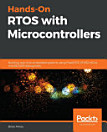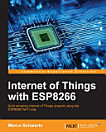Embedded Computing: A VLIW Approach to Architecture, Compilers and Tools
Joseph A. Fisher · Paolo Faraboschi · Cliff Young
Jan 2005 · Elsevier
4.0star
2 reviewsreport
Ebook
712
Pages
family_home
Eligible
info
reportRatings and reviews aren’t verified Learn More
About this ebook
The fact that there are more embedded computers than general-purpose computers and that we are impacted by hundreds of them every day is no longer news. What is news is that their increasing performance requirements, complexity and capabilities demand a new approach to their design. Fisher, Faraboschi, and Young describe a new age of embedded computing design, in which the processor is central, making the approach radically distinct from contemporary practices of embedded systems design. They demonstrate why it is essential to take a computing-centric and system-design approach to the traditional elements of nonprogrammable components, peripherals, interconnects and buses. These elements must be unified in a system design with high-performance processor architectures, microarchitectures and compilers, and with the compilation tools, debuggers and simulators needed for application development. In this landmark text, the authors apply their expertise in highly interdisciplinary hardware/software development and VLIW processors to illustrate this change in embedded computing. VLIW architectures have long been a popular choice in embedded systems design, and while VLIW is a running theme throughout the book, embedded computing is the core topic. Embedded Computing examines both in a book filled with fact and opinion based on the authors many years of R&D experience.· Complemented by a unique, professional-quality embedded tool-chain on the authors' website, http://www.vliw.org/book· Combines technical depth with real-world experience · Comprehensively explains the differences between general purpose computing systems and embedded systems at the hardware, software, tools and operating system levels. · Uses concrete examples to explain and motivate the trade-offs.
Ratings and reviews
4.0
2 reviews
About the author
JOSEPH A. FISHER is a Hewlett-Packard Senior Fellow at HP Labs, where he has worked since 1990 in instruction-level parallelism and in custom embedded VLIW processors and their compilers. Josh studied at the Courant Institute of NYU (B.A., M.A., and then Ph.D. in 1979), where he devised the trace scheduling compiler algorithm and coined the term instruction-level parallelism. As a professor at Yale University, he created and named VLIW architectures and invented many of the fundamental technologies of ILP. In 1984, he started Multiflow Computer with two members of his Yale team. Josh won an NSF Presidential Young Investigator Award in 1984, was the 1987 Connecticut Eli Whitney Entrepreneur of the Year, and in 2003 received the ACM/IEEE Eckert-Mauchly Award. He is also the recipient of the 2012 IEEE Computer Society B. Ramakrishna Rau Award, recognizing his work in the development of trace scheduling compilation and pioneering work in VLIW (Very Long Instruction Word) architectures.PAOLO FARABOSCHI is a Principal Research Scientist at HP Labs. Before joining Hewlett-Packard in 1994, Paolo received an M.S. (Laurea) and Ph.D. (Dottorato di Ricerca) in electrical engineering and computer science from the University of Genoa (Italy) in 1989 and 1993, respectively. His research interests skirt the boundary of hardware and software, including VLIW architectures, compilers, and embedded systems. More recently, he has been looking at the computing aspects of demanding content-processing applications. Paolo is an active member of the computer architecture community, has served in many program committees, and was Program Co-chair for MICRO (2001) and CASES (2003).CLIFF YOUNG works for D. E. Shaw Research and Development, LLC, a member of the D. E. Shaw group of companies, on projects involving special-purpose, high-performance computers for computational biochemistry. Before his current position, he was a Member of Technical Staff at Bell Laboratories in Murray Hill, New Jersey. He received A.B., S.M., and Ph.D. degrees in computer science from Harvard University in 1989, 1995, and 1998, respectively.
Rate this ebook
Tell us what you think.
Reading information
Smartphones and tablets
Install the Google Play Books app for Android and iPad/iPhone. It syncs automatically with your account and allows you to read online or offline wherever you are.
Laptops and computers
You can listen to audiobooks purchased on Google Play using your computer's web browser.
eReaders and other devices
To read on e-ink devices like Kobo eReaders, you'll need to download a file and transfer it to your device. Follow the detailed Help Center instructions to transfer the files to supported eReaders.




